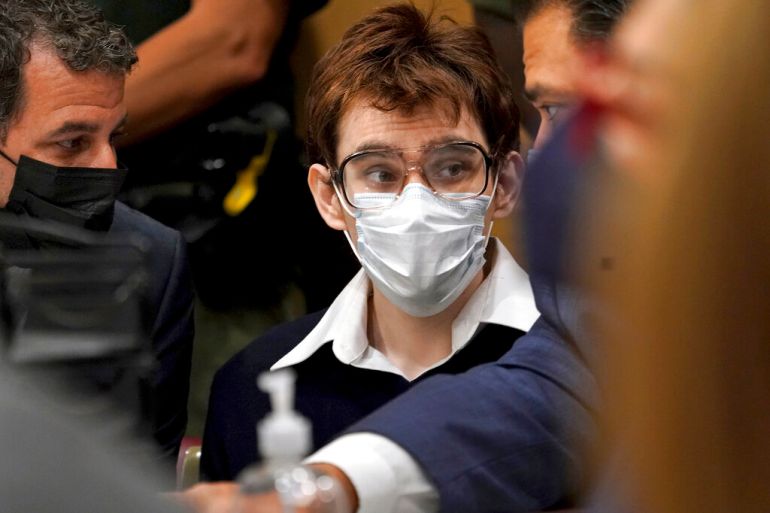Florida jury recommends Parkland shooter serve life in prison
Jury says Nicolas Cruz should not get the death penalty for the murder of 17 students and staff at US high school.

A Florida jury has recommended that a gunman who killed 17 people in a 2018 school shooting be spared the death penalty and instead be sentenced to life in prison without the possibility of parole.
Nikolas Cruz, now 24, pleaded guilty late last year to premeditated murder for the deaths at Marjory Stoneman Douglas High School in Parkland, Florida. His sentencing trial lasted for more than three months as the jury heard arguments for and against recommending the death penalty.
Keep reading
list of 3 itemsParents of Parkland victim urge Biden to act on gun control
FBI to pay millions to Parkland school shooting victims’ families
Jurors determined that in each of the 17 murders, mitigating circumstances outweighed aggravating factors, and they concluded on Thursday that the death penalty was not supported. Some parents expressed anger at the decision to spare Cruz from execution.
“We are beyond disappointed with the outcome today,” Lori Alhadeff, whose daughter, Alyssa, was killed, told a news conference following the announcement.
“This should have been the death penalty, 100 percent. 17 people were brutally murdered on February 14, 2018. I sent my daughter to school and she was shot eight times. I am so beyond disappointed and frustrated with this outcome. I cannot understand. I just don’t understand.”
The recommendation brings an end to a fraught trial that began in July, during which members of the jury were exposed to harrowing pieces of evidence, including graphic videos, photos, testimony from victims’ families and a tour to visit the blood-spattered building where the shooting took place.
The February 14, 2018, shooting was a devastating reminder of the spectre of gun violence in the United States and renewed a contentious debate over proposed solutions to staunch the epidemic of school shootings unique to the US. A final verdict on sentencing will be decided by a judge on November 1.
Cruz killed 17 people and wounded 17 in seven minutes, shooting students and staff in the school’s hallways, classrooms and grounds. He fled the scene, blending in among other students and was arrested later that same day.
Cruz’s defence never contested the fact that he carried out a horrific crime but maintained that other factors such as his biological mother’s substance abuse during pregnancy should be considered in the sentencing.
Prosecutors countered that Cruz planned the “systematic massacre” months in advance and had demonstrated that he did not suffer from serious neurological issues when he smoothly operated and reloaded his gun during the shooting.
Cruz had previously apologised for his crimes and asked that he be given life in prison without the possibility of parole. Under Florida law, the jury must unanimously recommend the death penalty for it to be considered in sentencing.
Some family members of those killed and injured left the court sobbing after hearing the jury’s decisions.
Deb Hixon, wife of Parkland victim Chris Hixon said she was “completely devastated and shocked” by the verdict. She said it sent a message tha Cruz’s life “meant more than the 17 that were murdered and the 17 that were shot, and the thousands of people in that school, in that community that are terrorized and traumatized every single day”.
Tony Montalto’s daughter Gina Montalto was shot by Cruz and he heads the group Stand with Parkland, advocating to make schools safer. He said the sentence did not honor the victims. “The monster that killed them gets to live another day,” he said.
Florida Governor Ron DeSantis also expressed disappointment with the decision, saying” “I just don’t think anything else is appropriate except a capital sentence.”
Since Cruz’s crime, school shootings have continued their role as a grim and tragically common feature of life in the US.
In May, a shooting at a school in Uvalde, Texas, killed 19 children and two teachers. After an outpouring of grief and anger, President Joe Biden signed a gun reform bill into law in June.
While the bill was a rare example of bipartisan gun legislation, critics say they believe it does not come close to addressing the scope of US gun violence.
Cruz is a rare example of a school shooter who has lived to be punished for his crimes. Nine other perpetrators of shootings that killed 17 or more people died by suicide or in shootouts with law enforcement during or after their attacks.